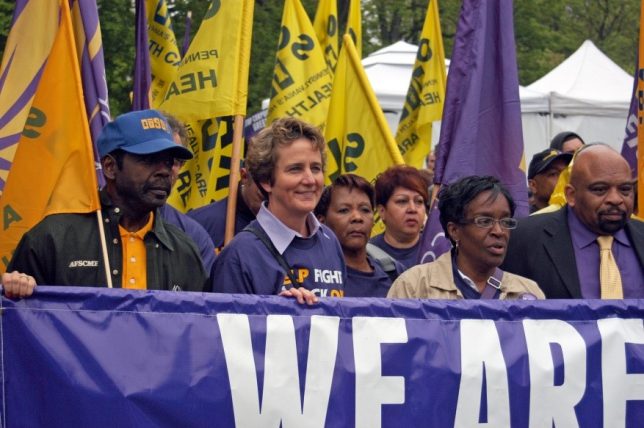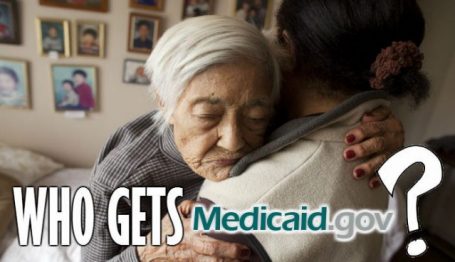Labor Watch
Dues Skim: Union Cronyism Resists Reform
 Mary Kay Henry, president of the SEIU
Mary Kay Henry, president of the SEIU

Dues Skim (Full Series)
How Unions Tried to Capture Taxpayer Funds | SCOTUS Steps In | Union Cronyism Resists Reform
Summary: In over a dozen states union-friendly politicians skim vast sums every year off people taking care of low-income children and disabled loved ones; the money is then funneled to unions. This scheme, which was overturned by the Supreme Court, is still partially functioning in some states.
A Harris Workaround in Washington State
In March 2018, in an effort to circumvent Harris v. Quinn, the Washington state legislature passed a bill that would privatize homecare providers.
Since the Supreme Court gave these partial public employees the ability to stop paying union dues the legislature enacted a Harris workaround (tagged in the two chambers SB 6199 and HB 2963) that would privatize homecare providers.
A February 2018 op-ed by the Seattle Times editorial board explained “The bill proposes outsourcing employment of roughly 34,000 individual care providers to a private vendor.”
The Times went to note that unlike typical pushes for privatization this effort would actually cost the state millions. “Vendors told DSHS they will spend 40 percent more than the state to provide the service…The state would end up spending at least $22 million more per biennium once the change is made. That’s money that could be spent increasing services for those in need.”
Ironically the SEIU, generally opposed to privatization, came out strongly in favor of the bill. Even more ironic were the actions of Washington State Rep. Eileen Cody (D-West Seattle), who sponsored another bill, HB 2361 in 2009. In a Freedom Foundation blog post, Maxford Nelson pointed out that HB 2361 “effectively did the exact opposite of what Cody now seeks to do with SB 6199.”
The 2009 bill was introduced and passed before the Harris ruling and according to Nelsen was a workaround for “caregivers who were related to their clients [so they] could choose to work through a privately-operated home care agency.” Before HB 2361, providers “contracting directly with the state were required to financially support SEIU 775. However, because several of the home care agencies were not unionized, family caregivers wishing to avoid association with SEIU 775 could simply work through one of the nonunion agencies.” But HB 2361 requires all caregivers to go through the state which forced them to pay dues to SEIU 775.
So why the change of heart?
Since Washington is not a right-to-work state, private sector workers cannot opt-out of paying unions. Harris applied to providers that were “partial public employees” receiving money from the state (that started as federal dollars) and gave them the freedom to stop paying their union, albeit with difficulty. If providers were now considered working for an agency they would be outside of the protections of Harris and as private sector “employees” would now be forced to pay the union.
With all that’s going on in her own backyard, it’s no wonder that Rep. McMorris Rodgers is considering bringing the federal government into this dispute.
Yes, with Harris v. Quinn SCOTUS offered a firm opinion, national in scope. Republicans’ federalist instincts might normally incline them to allow more leeway to implement such a decision slowly, at the state level. But when state governments fight tooth-and-claw to preserve the union advantage over the needs of people taking care of their loved ones it’s only natural that proponents of Harris rights will eventually ask the federal government to step in and make the law of the land, well, the law of the land. Don’t forget we’re talking about federal tax dollars here.
In Pamela Harris’s own backyard, Illinois Gov. Bruce Rauner (R) is also pushing the federal government to step in: Both Rauner’s general counsel and the director of the Illinois Department of Healthcare and Family Services co-signed a January 18, 2018 letter addressed to HHS, which oversees Medicaid. This letter questions whether the union dues skim is legal under the Medicaid Act.
These representatives of the Illinois governor’s office explain that by law the act requires any state-run Medicaid plans must ensure that “no payment under the plan for any care or service provided to an individual shall be made to anyone other than such individual or the person or institution providing such care or service.” The Act then went on to enumerate the only exceptions to this rule; the state taking out money for union dues wasn’t one of them.
Under the Medicaid Act, HHS has the authority – and some would say even the duty – to unilaterally end the dues skim for home healthcare providers. Whether coming from Congress or the HHS, such a move would instantly improve the lives of care recipients and caregivers, in other words, the people who have been working long hours for little pay for a very long time.
As Pamela Harris said before the Supreme Court heard her case, “I don’t want to be the face and name associated with an anti-union campaign, but this is at its heart a mother doing what she thinks is right for her son. … I don’t see this as a union issue, but the current administration in Illinois–” (which has now been replaced by a more reform minded one) “–has an unhealthy relationship with public sector unions.”

